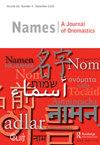中国第二外语(L3)学习者使用法语姓名作为身份标记的研究
IF 0.6
3区 文学
0 LANGUAGE & LINGUISTICS
引用次数: 0
摘要
使用外国名字已经成为学习外语的中国学生在多语言环境中培养特殊身份的常见做法。法语是中国学习最多的外语之一。然而,很少有人注意到学习者在使用法语名字作为身份标记时所遵循的做法。目前的研究通过调查在中国大学学习法语作为第二外语(L3)的中国大学生使用的29个法语名字来解决这一差距。根据访谈收集的数据,调查了受访者选择姓名的动机和特征。定性和定量分析表明,这些L3学生采用法语名字的做法主要是由语音特征和研究参与者的积极联想所驱动的。三级学习者有意选择一个法语名字,为自己创造一个多语言和多元文化的身份。还讨论了教师开发文化教材的教学意义,以及教师对法语教学的潜在影响。本文章由计算机程序翻译,如有差异,请以英文原文为准。
Adopting French Names as Identity Markers among Second Foreign Language (L3) Learners in China
Using foreign names has become common practice for Chinese students who are learning a foreign language to develop a special identity in multilingual contexts. French is one of the most studied foreign languages in China. Nevertheless, little attention has been paid to the practices learners follow when adopting French names as their identity markers. The current study addresses this gap by investigating twenty-nine French names adopted by Chinese university students who are learning French as the second foreign language (L3) in a Chinese university. Drawing on data collected through interviews, the motivations, and features behind the respondents’ name choices were examined. The qualitative and quantitative analyses show that the practice of adopting French names for these L3 students was primarily motivated by phonetic features and the study participants’ positive associations. The L3 learners deliberately selected a French name to create a multilingual and multicultural identity for themselves. The pedagogical implications regarding teachers’ development of cultural instruction materials as well as teachers’ potential influence on French language instruction overall are also discussed.
求助全文
通过发布文献求助,成功后即可免费获取论文全文。
去求助
来源期刊

Names-A Journal of Onomastics
Multiple-
CiteScore
1.30
自引率
50.00%
发文量
23
期刊介绍:
Names, the journal of the American Name Society, is one of the world"s leading journals in the study of onomastics. Since the first issue in 1952, this quarterly journal has published hundreds of articles, reviews, and notes, seeking to find out what really is in a name, and to investigate cultural insights, settlement history, and linguistic characteristics revealed in names. Individuals subscribing to Names automatically become members of the American Name Society and receive the journal as part of their membership.
 求助内容:
求助内容: 应助结果提醒方式:
应助结果提醒方式:


